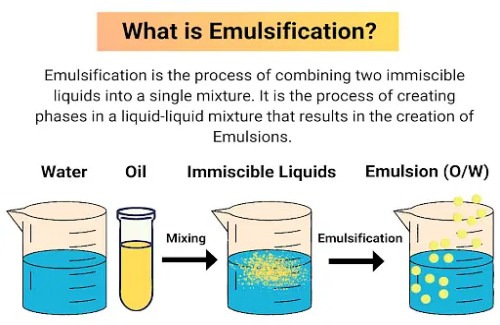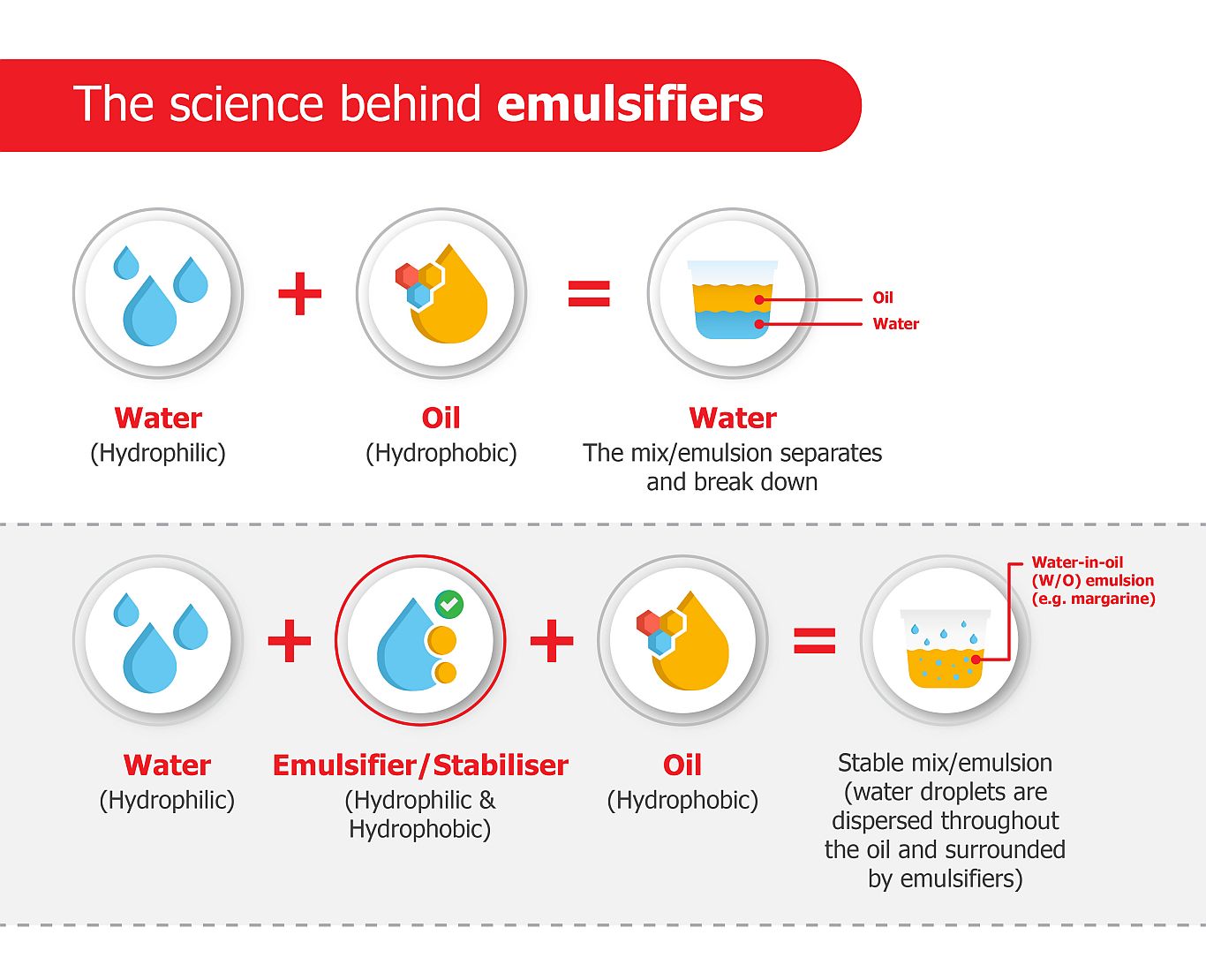Emulsifier In Food for Vegan Cooking
Wiki Article
All About the Function of an Emulsifier in Food and Its Significance in Modern Food
Emulsifiers are critical in modern food, helping with the blend of immiscible liquids like oil and water. Their capacity to support combinations boosts the texture and taste of numerous foodstuff. From salad dressings to baked goods, emulsifiers play a substantial role in both industrial and home food preparation. Yet, the science behind their feature and the future advancements in their use stay much less checked out. Emulsifier In Food. What more could be unearthed concerning these vital culinary agents?Comprehending Emulsification: The Scientific Research Behind the Refine
Emulsification might appear like an easy culinary technique, it includes complex scientific concepts that are essential for producing stable blends of immiscible fluids, such as oil and water. At the heart of this procedure exists the concept of surface stress, which prevents both fluids from blending normally. Emulsifiers, compounds that decrease surface area stress, play a vital duty in facilitating the combination of these liquids. They have both hydrophilic (water-attracting) and hydrophobic (water-repelling) buildings, permitting them to secure themselves at the user interface between oil and water.When an emulsifier is introduced and the mix is upset, it creates a safety obstacle around dispersed beads of one fluid within the other, supporting the mixture. This activity not only boosts texture and mouthfeel in food products however likewise adds to their aesthetic charm. Emulsifier In Food. Comprehending the scientific research behind emulsification is fundamental in modern cuisine, allowing chefs to develop a selection of sauces, dressings, and emulsified recipes
Usual Kinds Of Emulsifiers Utilized in Food
Emulsifiers are essential ingredients in the food sector, playing a crucial duty in stabilizing blends of oil and water. Various kinds of emulsifiers are commonly used, each with special properties suited for different applications. Lecithin, obtained from soybeans or egg yolks, is just one of the most prominent natural emulsifiers, often located in dressings and delicious chocolates. Mono- and diglycerides, which are obtained from glycerol and fats, are commonly made use of in baked goods and margarine to improve structure and prolong life span. One more common emulsifier is polysorbate 80, preferred for its ability to improve the uniformity of gelato and sauces. Additionally, xanthan periodontal and guar gum work as thickening representatives that also add to emulsification in gluten-free products. These emulsifiers are essential to creating a steady, tasty item in modern-day food formulas, ensuring a positive sensory experience for consumers.
The Role of Emulsifiers in Various Food Products
A range of foodstuff depend on emulsifiers to accomplish desired appearances and stability. These materials facilitate the blending of immiscible fluids, such as oil and water, which is crucial in many processed foods. As an example, in salad dressings, emulsifiers assist maintain a regular mix, protecting against splitting up and enhancing shelf life. In baked goods, they contribute to an uniform crumb structure and dampness retention, enhancing overall quality.Emulsifiers likewise play a substantial role in dairy items, such as gelato and yogurt, where they support fat blobs, making sure a smooth mouthfeel. Additionally, in condiments and sauces, they boost thickness and enhance spreadability. This capability is vital in the production of delicious chocolates, margarine, and mayonnaise, where a natural product is required. In general, using emulsifiers in numerous food items is essential to modern food production, boosting security and uniformity throughout a large range of products.
How Emulsifiers Enhance Appearance and Flavor

When integrated right into foodstuff, emulsifiers substantially enhance both structure and flavor, producing an even more delightful eating experience. These compounds promote the mixing of components that usually do not mix well, such as oil and water, leading to a smoother, creamier uniformity. This not only improves mouthfeel however likewise allows tastes to distribute equally throughout the product, enhancing the total preference.

Emulsifiers in Home Food Preparation: Tips and Techniques
Just how can home cooks properly use emulsifiers to improve their meals? Emulsifiers play an important function in attaining preferable structures and tastes in homemade dishes. For example, using egg yolks in mayonnaise or hollandaise sauce enables a steady solution, incorporating oil and water successfully. Home cooks can also explore mustard, which acts as an emulsifier in vinaigrettes, making sure a smooth consistency.In cooking, incorporating lecithin, found in egg yolks or soy, can enhance dough stability and wetness retention. Furthermore, utilizing industrial emulsifiers like xanthan periodontal or guar periodontal can assist enlarge sauces and dressings while maintaining a velvety mouthfeel.
When producing ice lotions or whipped garnishes, emulsifiers can stop ice crystal development, causing a smoother appearance. By grasping these methods, home cooks can greatly raise their cooking developments, giving regular and delightful dishes that display the power of emulsification.
The Future of Emulsifiers in Culinary Innovation
As the culinary globe remains to develop, the role of emulsifiers is poised to become progressively cutting-edge and diverse. Developments in food science are resulting in the growth of new emulsifying representatives stemmed from natural resources, which accommodate health-conscious customers and boost the sensory high qualities of meals. Advancements such as plant-based emulsifiers are obtaining traction, permitting chefs to produce vegan and allergen-free options without compromising texture or flavor.Furthermore, the usage of emulsifiers in molecular gastronomy is expanding, making it possible for cooks to experiment with unique structures and presentations that mesmerize restaurants. As sustainability ends up being a top priority, the future may see a shift in the direction of environmentally friendly emulsifiers that reduce ecological impact.
Inevitably, emulsifiers will certainly proceed to play a crucial role in culinary technology, connecting the void between tradition and modernity, and permitting chefs to press the boundaries of imagination in their kitchens.
Regularly Asked Concerns

Are Emulsifiers Safe for People With Allergies?
Emulsifiers can be secure for people with allergic reactions, depending upon their particular sensitivities. However, specific emulsifiers, stemmed from allergenic resources like soy or eggs, might set off reactions, necessitating cautious component scrutiny and examination with health care experts.Exactly How Do Emulsifiers Influence Food Shelf Life?
Emulsifiers boost food shelf life by supporting blends, stopping separation, and decreasing microbial development. This stability assists maintain appearance and taste over time, allowing items to remain enticing and risk-free for consumption longer than without emulsifiers.Can Emulsifiers Be Derived From All-natural Resources?
Yes, emulsifiers can be originated from all-natural resources such as plants, eggs, and milk products (Emulsifier In Food). These natural emulsifiers aid support mixes, enhancing structure and uniformity in various food applications while being preferred for health-conscious consumersWhat Are the Ecological Effects of Emulsifier Production?
The ecological impacts of emulsifier production include source depletion, environment devastation, and air pollution from synthetic procedures. Natural emulsifier sourcing can mitigate some results, however generally, industrial practices still position top article substantial eco-friendly challenges to environments worldwide.

Are There Vegan Emulsifiers Available in the Market?
Yes, there are several vegan emulsifiers readily available in the marketplace, such as useful reference lecithin stemmed from soy or sunflower, guar gum, and xanthan gum. These options accommodate plant-based diets without endangering emulsifying homes.Emulsifiers are necessary active ingredients in the food sector, playing a critical duty in stabilizing mixes of oil and water. A range of food products count on emulsifiers to achieve preferred textures and stability. When incorporated into food products, emulsifiers greatly boost both structure and taste, producing a more enjoyable eating experience. Additionally, emulsifiers can maintain air pockets in whipped items like mousses and creams, leading to a light and airy structure. Emulsifiers improve food shelf life by maintaining mixtures, stopping splitting up, and decreasing microbial growth.
Report this wiki page